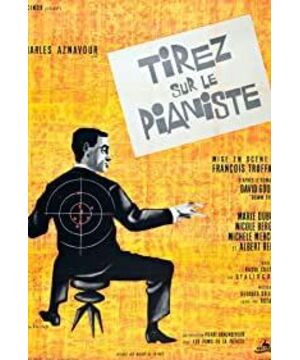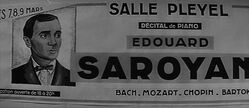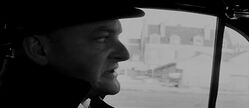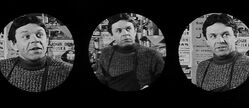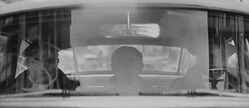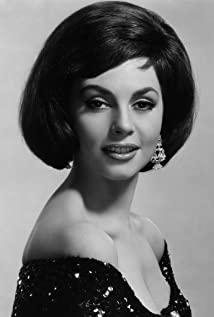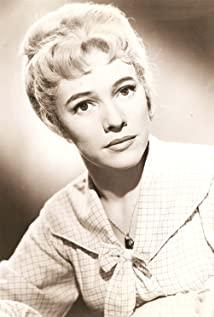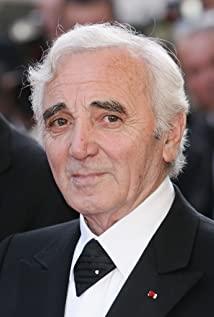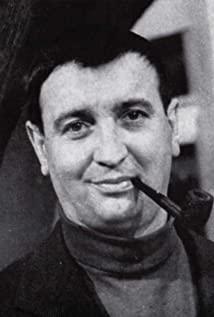The background information tells us that Truffaut was inspired by an American novel "DOWN THERE". The story, background and character description follow the genre model of the thriller, but he does not respect the novel. Here, the crime and horror of the original are no longer relevant, and the patterns and conventions of the genre are dealt with in an ironic way. The first three minutes of the film have little to do with the main line (many three minutes in the film have little to do with the main line): The pianist's brother ran and ran, hit a telephone pole and fainted, and was rescued by a man , the guy just talked to him about his happy family and the virginity rate in Paris, then he turned and never showed up again.
In short, the whole film is very complex, jumping all the time, and the story and themes are incomplete - you can even say that it is arbitrary, you can say wherever you want, and say what you want to say. The camera is often suddenly aimed at an irrelevant person, and then follows that person and runs away, leaving the protagonist aside.
Truffaut said in an interview: "The idea behind Shooting the Pianist was to make a film without a theme, just in the form of a detective story, to express my love for glory, success, depravity, failure, women and so on. The whole view of love." In the constant shifting and unpredictable shifts of atmosphere between comedy, tragedy and absurd styles, we see a gloomy pianist with a split personality, a pianist's distressed ex-wife, a pure-looking bar girl who loves to speak foul language Waiter, a robber who always talks about his father and loves to buy novelty gadgets. Among them, it seems that except for the robbers, other people have no clear purpose in life. Wherever they go, and the wonderful destiny that keeps jumping again and again pushes them to the cusp of their emotions and life, and again and again fiercely. fall down. People try hard but get what they want in the end, and life is still peaceful in vain struggles - no one can control their own destiny.
The pianist is the most typical character in the whole film, and events and other characters revolve around him. It is not difficult to see his split: he has two names: Charlie and Edward, two identities: a bar pianist and a famous pianist, two personalities: what he thinks in his heart and what he does are completely different things. He felt "should" do it, but so what? It is difficult for him to grasp fate and control the situation, because he knows it is pointless to do so. A person is torn into a huge blank in two extremely heavy divisions, and his nothingness has become a powerful weapon against all absurdity and anguish. Nothingness is the most unshakable existence that settles at the bottom of the times. Schopenhauer's philosophy is reflected in it, and the film is completely against "free choice".
But we don't even feel the pain in the film most of the time - almost everyone is numb, they don't care about the deep pain, they're silent or chattering, and they've completely lost their sense of the rush of life. What's more annoying is that life is a tedious, exhausting repetition of itself. From the two loves of the pianist, it can be seen how similar the love between the pianist and Lena as the outer pianist is and the love between the pianist and Tereza as the inner pianist is similar - in the end, the two women who are also waitresses die together. On the black asphalt road, one dies in the white snow, and at the end of the film there is a new waitress at the bar. And pianists are very similar to bar owners and piano managers in their extreme attitudes toward women. In the past, we all had "a tale of devoted love, and a splendidly successful romance underpinned by a dark deal," but now, "lit by a hopeless romantic dream A story of an obscure and dirty life." The film deconstructs and subverts the classics to the effect of surprise and shock, and conveys a sense of boredom and absurdity. These are the things that most characterize the New Wave: the spontaneity and improvisation that give Shooting Pianist a curious, elusive quality.
No matter how tragic the ending and characters are, the film is still hilarious. It jumps with occasional out-of-the-ordinary touches: the pianist interview, Tereza's suicide, and the robber's curse about his mother are all hilarious, genius passages, all of which project a terribly imaginative and inspiring, Has a certain sense of elitist and a sense of humor that belongs only to the few. Vincent Cairnby's assessment is quite spot on: "Quotations are always related to the multi-layered structure of a film that Truffaut makes with apparent ease. But they are not for the chief pleasure he provides. Essential things, but perks."
View more about Shoot the Piano Player reviews


